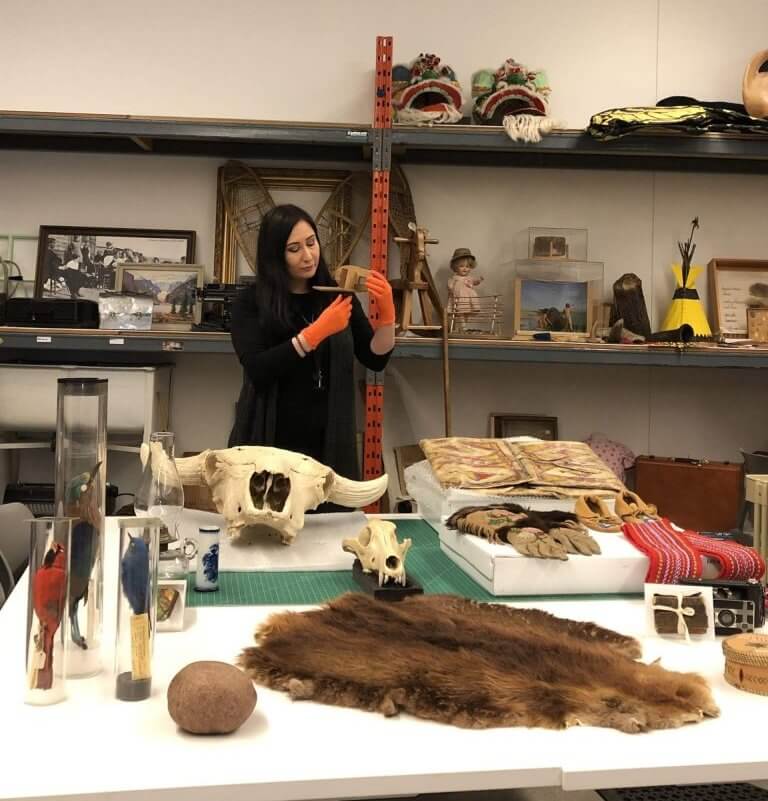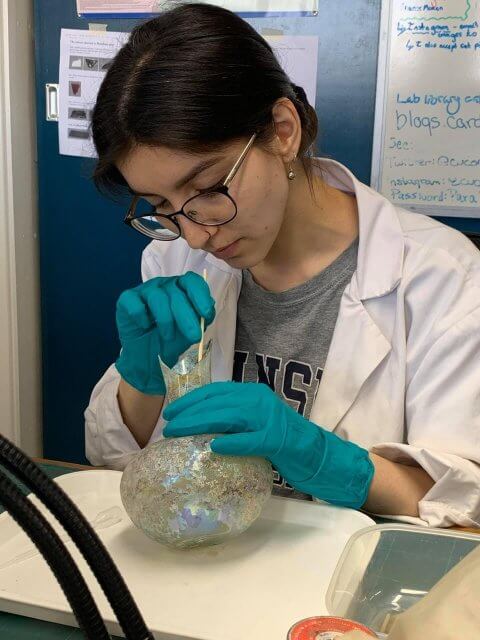A learner’s perspective on heritage conservation during a pandemic
Last September AU, in partnership with the International Centre for the Study of the Preservation and Restoration of Cultural Property (ICCROM) and the International Institute for Conservation of Historic and Artistic Works (IIC), hosted a webinar called “Heritage Conservation Learning in the COVID World.”
The webinar focused on discussions between heritage conservation educators and students from around the world about the challenges faced during the first wave of COVID-19. Together, Sermoneta and Bhatty acted as student representatives and helped organize and promote the webinar through a social media campaign aimed at connecting with students to understand their concerns and priorities during the pandemic.
After the social media campaign finished, Sermoneta and Bhatty took their findings and compiled them in an article called “Investigating Heritage Conservation Students’ Priorities in the COVID and Post-COVID World”.
We spoke with Sermoneta and Bhatty about their experience working on the social media campaign and writing the article.
Can you tell me a bit more about you and the work you are doing?
Eleonora Sermoneta: I’m a Heritage Resources Management learner at Athabasca University and I work as a Learning Programmer at the Royal Alberta Museum.
Together with Amber, we worked with Athabasca University, the International Centre for the Study of the Preservation and Restoration of Cultural Property (ICCROM), and the International Institute for Conservation of Historic and Artistic Works (ICC) to organize the webinar Heritage Conservation Learning in the COVID World – Challenges and Opportunities. The webinar took place on September 22, 2020.
Amber Bhatty: I’m in my final year of my MSc in conservation practice at Cardiff University in the U.K. Working on the webinar was an exciting experience, we had the chance to connect with international panellists to discuss how heritage conservation learning had been impacted by the pandemic and had to evolve to bounce back.

Can you describe the social media campaign you worked on back in September?
Bhatty: The social media campaign was for us to connect with students and really try to understand their concerns and priorities during the pandemic by creating a “safe space” for them to voice their opinions.
Sermoneta: We were the student panellists, and as representatives of the students we wanted to make sure to connect with our target audience in a meaningful way and represent their concerns with accuracy. Social media seemed to be the natural means to amplify student voices and allow us to do some community engagement.
Were there any insights that from other students that you found?
Sermoneta: You know, we found out that many students were concerned about finding an alternative placement and volunteer opportunities, with some expressing that they would like support in finding alternatives to traditional placements. Almost everyone wanted to make sure they would have enough hands-on learning and lab time. Many students recognized that conservation theory could be learned online, however, nearly all of those who commented said that they felt online learning could not replace the practical element of heritage conservation. Another interesting finding is that students expressed concerns regarding employability post-COVID due to a lack of practical experience.
Bhatty: I’d also like to add though, that quite a few students mentioned positives that had arisen from the situation, such as gaining knowledge via the increased accessibility of online resources like webinars, online courses, and online conferences. More time was able to be spent on things such as in-depth research, digital skills, or documentation.

Can you describe the article for those who haven't read it?
Bhatty: The article is written from our perspective as students and focuses on our role as student representatives in the webinar. It goes into the methodology behind how we engaged with the students on our social media and the results we got from it.
Sermoneta: We also used this article as a segue opportunity into the next webinar, which is going live on June 24, 2021, and it’s going to focus on what is essential in heritage conservation during a pandemic.
Was there anything interesting you learned when working on the article?
Sermoneta: It takes a village to publish an article! Amber and I were lucky to have the support of IIC News in Conservation editor, Sharra Grow. She guided us through the editing process and provided us with some great input.
Bhatty: Yes I completely agree with Eleonora. This collaborative opportunity made writing the article a really great experience especially as Eleonora and I worked so well together and were always on the same page, even if we weren’t in the same time zone!
How has the pandemic impacted the field of heritage conservation learning?
Bhatty: Well, because of the pandemic, museums and teaching institutions had to close their doors to the public and to students, which translated into a shortage of hands-on training and placement opportunities for conservation students.
Sermoneta: Both teaching institutions and students had to quickly adapt to this new reality and switch to online learning and engagement as well. It has been a steep learning curve for us all as we try to navigate through the challenges the pandemic brought upon us.
Do you have any recommendations for students that are now doing their work online?
Bhatty: I’d say to try and find your online community so that you can interact with your peers, learn from them, and retain that connection to the sector. This was extremely useful for us and we made new friends in the process.
Sermoneta: I echo what Amber is saying. The online heritage conservation community is great and very supportive. If you want to connect with us, make sure to pay a visit to our social media:
Facebook: hc.covidlearning
Instagram: hc.covidlearning
Twitter: HCovidlearning
Read Bhatty and Sermoneta’s article in the newest issue of News in Conservation. If you want to learn more about heritage conservation, you can join the next webinar on June 24, 2021, or visit AU’s Heritage Resource Management program’s website.